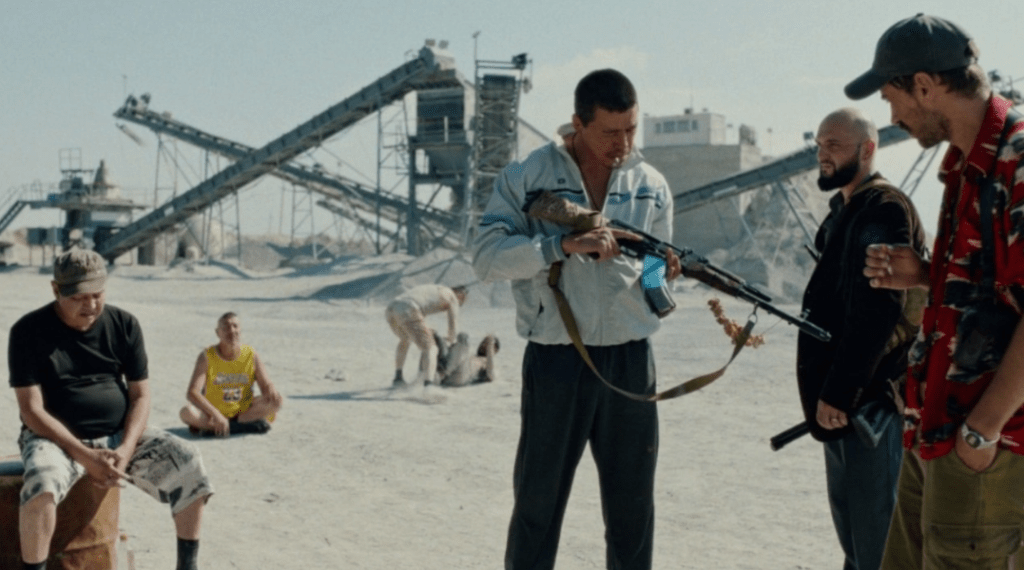With his new film “Goliath,” director Adilkhan Yerzhanov once again takes his audience into the vastness of the Kazakh steppe. The revenge western celebrated its German premiere on 29 April at the 23rd goEast Central and Eastern European Film Festival in Germany.
The film begins with a tribunal. Gangster Poshayev (played by Daniyar Alshinov) and his gang have just robbed the local police station. Now the three policemen and a villager named Karina are standing against the wall. Karina is offered one last cigarette; one of the gangsters reads out the statement she has just made against Poshayev. Poshayev pulls the trigger.
In the next scene, Karina is carried to her grave. Poshayev crouches down next to her widower Arzu (played by Berik Aytzhanov), who is sitting on the ground next to the burial mound. Poshayev explains that he couldn’t do otherwise. He wants to know if Arzu has a problem with him because of this. Arzu replies in the negative, followed by Poshayev giving him money and offering work. It is this combination of carrot and stick that establishes Poshayev’s rule over Karatas.
Kazakh western
Karatas, a fictional village in the Kazakh steppe, has also been the setting for Adilkhan Yerzhanov’s previous films. As in “A Dark, Dark Man”, Yerzhanov tells a story of injustice and powerlessness, with rough and sometimes desolate steppe providing a fitting background.
It was probably also the vastness of the breathtaking landscape that inspired the director to shoot a western. Because that is exactly what “Goliath,” with its hero taking on a gang of criminals on his own, is all about. Scenes in the mine that dominates the village and shootouts on a railway line in the steppe are further reminiscences of the genre.
The limping and stuttering Arzu is an unlikely hero. As villagers suspect he wants to take revenge on Poshayev for the death of his wife, they beat him up and chase him out of Karatas along with his young daughter, whom he looks after on his own after the death of his wife. It is thanks to Poshayev that almost all the villagers have jobs in the local mine – the very rumour that people might be against him is therefore dangerous. But when Arzu’s brother is also murdered by Poshayev’s men, Arzu takes on the quest for revenge.
The power of the strongest
With its magnificent landscape shots, a story of powerlessness in the face of crime tied to state power, and not least because of the Old Testament reference in the title, “Goliath” (a name that is not even mentioned in the film) has some parallels to Andrey Zvyagintsev‘s masterpiece “Leviathan”. So old wine in new bottles?
Not at all. Because with “Goliath”, Yerzhanov delivers a successful parable of power. While Danila Bagrov, the main character in Aleksei Balabanov’s epic gangster film “Brat” (Brother), justifies his actions by saying that “power lies in the truth”, Poshayev’s views are free of such morality and much less philosophical. Aware of his own crudeness, he explains to Arzu, pointing to his Kalashnikov: “This is power.”
However, Yerzhanov is not satisfied with such a flat answer. Almost as if to emphasise the importance of the question of power, he inserts appropriate quotes from Niccolò di Bernardo dei Machiavelli’s “The Prince” at various points in the film. The fact that Poshayev is also a “Machiavellian”, without presumably ever having read the Italian philosopher, is shown by another quote from “The Prince”. In the key scene of the film, in which Poshayev explains the principle of power to Arzu, he says that one has to be a lion and a fox at the same time: Because the lion cannot smell snares, and the fox gets no respect.
In the end, it is Poshayev himself who does not pay enough attention. He only realises the double game of the ostracised fox Arzu when it is too late. “Those that have been best able to imitate the fox have succeeded best,” Machiavelli concludes his comparison.
A film worth seeing
With “Goliath,” Adilkhan Yerzhanov has once again produced the best art-house cinema, which is well received by European audiences but hardly attracts any attention in Kazakhstan itself. Filmmaker Aida Adilbek reported during a symposium at the goEast film festival that “Goliath” was only screened in Almaty – and only for five days.
Read more on Novastan: “Alaqan”: Aida Adilbek’s decolonial documentary cinema
Nevertheless, the director has remained true to himself for years and delivers what his fans expect most. Yerzhanov knows how to stage a sad, socially critical story embedded in a breathtaking landscape of the steppe, using great camera angles and ingenious play of light and darkness. The film also impresses with its details and allusions, which are unfortunately not always immediately obvious. Even if “Goliath” is not the best story ever told by Yerzhanov, it is certainly a film worth seeing.
For more news and analysis from Central Asia, follow us on Twitter, Facebook, Telegram, Linkedin or Instagram.
 “Goliath” – a parable of power
“Goliath” – a parable of power 



